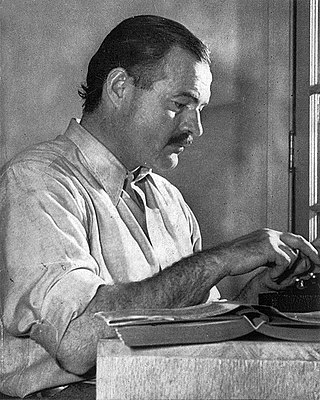
Ernest Miller Hemingway was an American novelist, short-story writer and journalist. Known for an economical, understated style that influenced later 20th-century writers, he has been romanticized for his adventurous lifestyle and outspoken, blunt public image. Some of his seven novels, six short-story collections and two non-fiction works have become classics of American literature, and he was awarded the 1954 Nobel Prize in Literature.
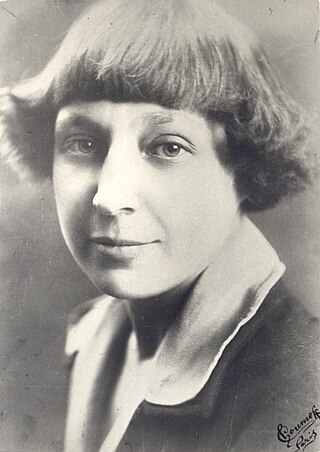
Marina Ivanovna Tsvetaeva was a Russian poet. Her work is some of the most well-known in twentieth-century Russian literature. She lived through and wrote about the Russian Revolution of 1917 and the subsequent Moscow famine.

Anna Andreyevna Gorenko, better known by the pen name Anna Akhmatova, was a Russian poet, one of the most significant of the 20th century. She reappeared as a voice of Russian poetry during World War II. She was nominated for the Nobel Prize in Literature in 1965 and 1966.
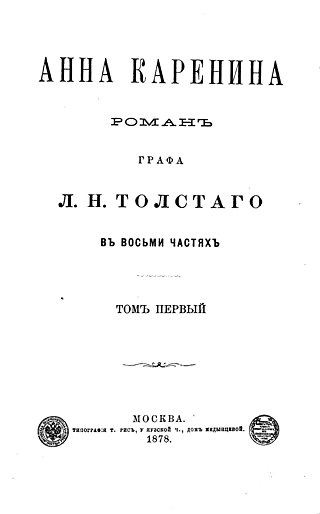
Anna Karenina is a novel by the Russian author Leo Tolstoy, first published in book form in 1878. Considered to be one of the greatest works of literature ever written, Tolstoy himself called it his first true novel. It was initially released in serial installments from 1875 to 1877, all but the last part appearing in the periodical The Russian Messenger. By the time he was finishing up the last installments Tolstoy was in an anguished state of mind and, having come to hate it, finished it unwillingly. When William Faulkner was asked to list what he thought were the three greatest novels, he replied: "Anna Karenina, Anna Karenina, and Anna Karenina".

Kolyma or Kolyma Krai is a historical region in the Russian Far East that includes the basin of Kolyma River and the northern shores of the Sea of Okhotsk, as well as the Kolyma Mountains. It is bounded to the north by the East Siberian Sea and the Arctic Ocean, and by the Sea of Okhotsk to the south. Kolyma Krai was never formally defined and over time it was split among various administrative units. As of 2023, it consists roughly of the Magadan Oblast, north-eastern areas of Yakutia, and the Bilibinsky District of Chukotka Autonomous Okrug.
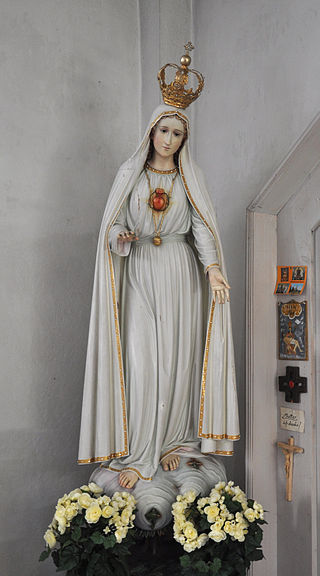
The Three Secrets of Fátima are a series of apocalyptic visions and prophecies reportedly given to three young Portuguese shepherds, Lúcia Santos and her cousins Jacinta and Francisco Marto, by a Marian apparition, starting on 13 May 1917. The three children claimed to have been visited by the Virgin Mary six times between May and October 1917. The apparition is now popularly known as Our Lady of Fátima.

Zinaida Nikolayevna Gippius or Hippius was a Russian poet, playwright, novelist, editor and religious thinker, one of the major figures in Russian symbolism. The story of her marriage to Dmitry Merezhkovsky, which lasted 52 years, is described in her unfinished book Dmitry Merezhkovsky.
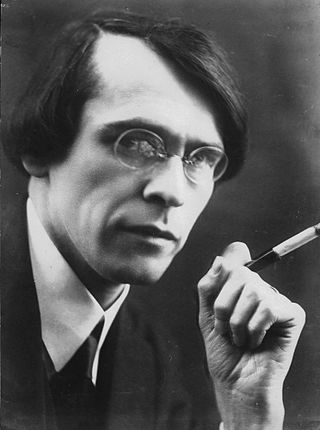
Vladislav Felitsianovich Khodasevich was an influential Russian poet and literary critic who presided over the Berlin circle of Russian emigre litterateurs.
Anatoly Naumovich Rybakov was a Soviet and Russian writer, the author of the anti-Stalinist Children of the Arbat trilogy, the novel Heavy Sand, and many popular children books including Adventures of Krosh, Dirk and Bronze Bird. One of the last of his works was his memoir The Novel of Memoirs (Роман-Воспоминание) telling about all the different people he met during his long life. Writer Maria Rybakova is his granddaughter.
Árni Jóhannsson Bergmann is an Icelandic writer, newspaper editor, literary critic, and translator of Russian literary works.

Nina Nikolayevna Berberova was a Russian writer who chronicled the lives of anti-communist Russian refugees in Paris in her short stories and novels. She visited post-Soviet Russia. Her 1965 revision of the Constance Garnett translation of Leo Tolstoy's Anna Karenina with Leonard J. Kent is considered the best translation so far by the academic Zoja Pavlovskis-Petit.

Maria Ignatievna von Budberg-Bönninghausen, also known as Countess von Benckendorff and Baroness von Budberg, was a Russian adventuress and suspected double agent of the Soviet Union secret police (OGPU) and the British Intelligence Service.
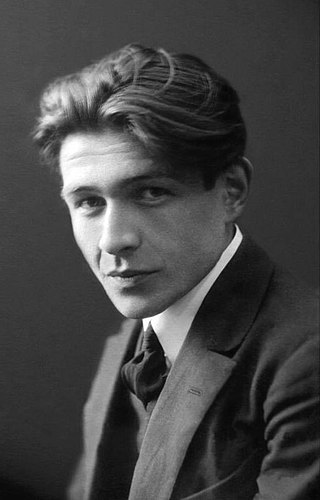
Gaito Gazdanov was a Russian émigré writer of Ossetian descent, who lived in Paris. Gazdanov's first stories were published in France in 1926 in Russian. His novels An Evening with Claire (1929) and The Spectre of Alexander Wolf (1948) became his most well-known works, mentioned by writers Maxim Gorky, Ivan Bunin and Vladislav Khodasevich. Gazdanov was a member of the French Resistance in occupied France. In 1953, he joined Radio Free Europe/Radio Liberty as an editor. Although he learned perfect French whilst living in France, Gazdanov continued writing stories in Russian.
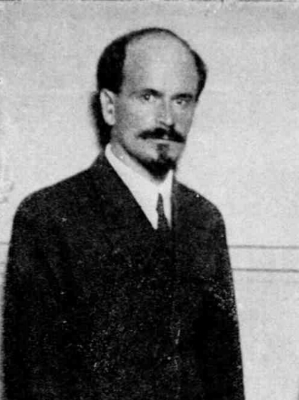
Vadim Viktorovich Rudnev was a Russian politician and editor. On 11 July 1917, Moscow City Duma elected him Moscow's Gorodskoy Golova.

Ivan Sergeyevich Shmelyov was a Russian writer best known for his full-blooded idyllic recreations of the pre-revolutionary past spent in the merchant district of Moscow. He was a member of the Moscow literary group Sreda. After the October Revolution Shmelyov fled to France, becoming an émigré writer.

Princess Nina Georgievna of Russia, was the elder daughter of Grand Duke George Mikhailovich and Grand Duchess Maria Georgievna of Russia. A great-granddaughter of Tsar Nicholas I of Russia, she left her native country in 1914, before World War I finished her education in England and spent the rest of her life in exile. In London in 1922, she married Prince Paul Chavchavadze, a descendant of the last king of Georgia. They had one child, Prince David Chavchavadze, born there two years later. In 1927 the family of three moved to the United States and settled in New York. In 1939 they bought a home in Wellfleet, Massachusetts. Princess Nina was an artist, her husband worked as an author; he wrote five books and translated several others. Their son, Prince David Chavchavadze, served with the U.S. Army during World War II and, thanks in part to his knowledge of Russian, eventually became a CIA officer. After his retirement, he wrote his memoirs and published those of his grandmother, Grand Duchess George, as well as a book about the grand dukes of Russia.
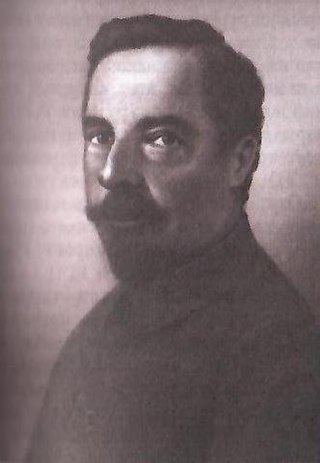
Pavel Pavlovich Muratov, also known as Paul Muratov or Paul Muratoff, was a Russian essayist, novelist, art historian, critic and playwright.

The Life of Arseniev: Youth is an autobiographical novel by Nobel Prize-winning Russian author Ivan Bunin seen by many as his most important work written in emigration. It is Bunin's only full-length novel.

Vazif Sirazhutdinovich Meylanov was a Soviet mathematician, social philosopher, writer, Soviet dissident, and political prisoner (1980–1989). He became renowned for his critical works on the theory of socialism, as well as for singular endurance and uncompromising attitude towards authorities during his prison terms.
Marian Schwartz is an American translator of contemporary Russian literature. She is the principal English translator of the author Nina Berberova and has translated over 70 books of fiction, history, biography, and criticism into English. She is the recipient of two translation fellowships from the National Endowment for the Arts. Based in Austin, Texas, she is the former president of the American Literary Translators Association.

















